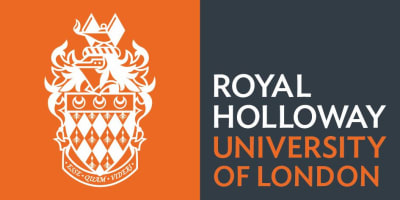
MSc Logistics and Supply Chain Management
Royal Holloway University of London

Key Information
Campus location
London, United Kingdom
Languages
English
Study format
On-Campus
Duration
1 year
Pace
Full time
Tuition fees
GBP 21,700 / per year *
Application deadline
31 Jul 2024
Earliest start date
Sep 2024
* EU and international student tuition fee per year. UK student tuition fee per year - £13,200
Introduction
Whatever the industry, and whether operating globally or nationally, it’s more important than ever for businesses to manage their supply chains and ecosystems carefully in order to succeed. Companies, government departments, and international organisations cannot survive for long without rigorous, efficient and strategic management of supply chains and logistics. They need to demonstrate their resilience against disruption and adversity, the incorporation of new technologies, and the application of e-security, location, and outsourcing decisions in a world of rapid technological change, global industrial restructuring and retrenchment and onset of dangerous climate change.
On our one-year Logistics and Supply Chain Management MSc, taught at our London location, you’ll gain a thorough understanding of the forces at work and knowledge of sophisticated tools to strategically manage both large, complex, technology-based supply chains, as well as more traditional ones. You’ll cover logistics and procurement often across national boundaries, companies, regions, and time-zones.
Our focused and highly relevant curriculum is based on current thinking and real-world experience and needs in managing supply chains globally as technologies, markets and the international business and trade environment are changing fast. You’ll learn from senior academics and experienced practitioners, with input from CEOs and senior executives across a range of industries. These industry connections have informed the content and design of the course.
We recruit students from arts, sciences, manufacturing, business, management, and services and prepare them for successful careers across many industries: high technology manufacturing, engineering, electronics and computing, service sectors, fashion and clothing, food and agriculture, pharmaceuticals and bio medical, aid agencies, disaster relief and NGOs.
- This MSc is accredited by The Chartered Institute of Logistics and Transport and is studied at our campus right in the centre of London.
Read more about our course on our website.
From time to time, we make changes to our courses to improve the student and learning experience. If we make a significant change to your chosen course, we’ll let you know as soon as possible.
Gallery
Admissions
Scholarships and Funding
We have a range of scholarships available.
Royal Holloway International Postgraduate Early Payment Discount
Tuition fee discount of £1,000 for international postgraduate students.
The discount is awarded automatically to new international postgraduate students, who pay their deposit by 1 June 2024.
Please read the full terms and conditions on the website here.
Curriculum
Course structure
Core Modules*
- Operations and Quality Management
- Purchasing & Inventory Management
- Industry Engagement
- Professional Project Management Skills
- Strategic Supply Chain Management
- Warehousing and Distribution Network Design
- Supply Chain Resilience and Risk Management
- Independent Business Research Project
Optional Modules*
There are a number of optional course modules available during your degree studies. The following is a selection of optional course modules that are likely to be available. Please note that although the College will keep changes to a minimum, new modules may be offered or existing modules may be withdrawn, for example, in response to a change in staff. Applicants will be informed if any significant changes need to be made.
- Sustainable Supply Chains
- Supply Chain Optimisation and Decision-Making using Analytics
- Supply Chain Innovation
- Supply Chains in Emerging Economies
Teaching and assessment
Over the 12 months of this course, you’ll take seven taught course units, attend various seminars and workshops and complete an independent business research project. And at the end of the year, you will apply the techniques and theories you’ve learned during the taught elements in a Masters level thesis of 10,000–12,000 words on a supply chain related topic. The dissertation will typically consist of a literature review followed by empirical work, involving either qualitative or quantitative research.
You’ll learn from highly experienced practitioners, including input from CEOs and senior executives from international firms across a range of industries. These industry connections have informed the content and design of the course, in a way that will not only build on your existing knowledge and experience but increase your chances of finding employment at a salary level higher than the graduate national average wage in your chosen sector.
*The course is currently being updated to reflect current trends. Titles and details of modules may be subject to change before the start of the course in September 2024. Please make sure to check the website course page or contact us directly for the very latest information if you are considering an application.
Program Outcome
On our one-year Logistics and Supply Chain Management MSc, taught at our London location, you’ll gain a thorough understanding of the forces at work and knowledge of sophisticated tools to strategically manage both large, complex, technology-based supply chains, as well as more traditional ones. You’ll cover logistics and procurement often across national boundaries, companies, regions, and time-zones.
Program Tuition Fee
Career Opportunities
Your future career
Graduates of our supply chain courses have proven to be highly employable and pursued careers across a range of industries.
Roles in supply chain and logistics management can vary and are not limited to professionals who oversee the implementation and operations of supply chains, outsourcing, procurement, transportation, and logistics. A typical role could include taking ownership of a specific aspect of a supply chain project, ensuring that it is delivered to all stakeholders and meets the competitive needs of an organisation. You might be the person who provides detailed knowledge on a specific supply chain management discipline, or provides professional support services to a range of supply chain and procurement needs of an organisation, including international aid and disaster relief logistics management and planning.
With an MSc, you can progress your career in a wide range of positions in industry, make substantial contributions to multidisciplinary teams, strategically managing domestic and international supply chains, logistics, procurement, global sourcing, finance, technology acquisition, and risk management, amongst others. This will help you progress through an organisation into senior management positions or change career paths across industries, government, and NGOs. Some industries you could go into include:
- Electronics, Mobile Communication and Computing
- Pharmaceuticals and Healthcare
- Food and Agriculture
- Energy
- Supermarkets
- Textiles, Clothing and Fashion Industries
- Finance and International Banking
- Manufacturing, Aerospace, Automotive, Heavy Engineering
- High –tech Materials and Components Start-Ups
- Minerals, Oil &Gas
- Commodities Trade, Procurement and Distribution
- Shipping
- Airlines
- Music, Film Production, TV Production
- Government Departments
- International Aid, Disaster Relief and NGO

This course is accredited by the Association to Advance Collegiate Schools of Business (AACSB). This means your qualification is recognised in the industry, giving you a competitive edge when applying for jobs.
This MSc is accredited by The Chartered Institute of Logistics and Transport